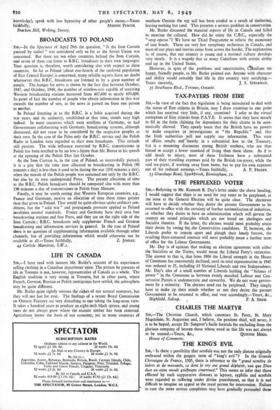MAKRONESOS SIR, —After reading Mr. F. A. Voigt's article Makronesos in
the Spectator of April 22nd, I can only presume that his obvious affection for the Athens regime causes him to see its plague-sores as beauty-spots. Love is notoriously blind.
First, on a personal matter. Mr. Voigt says: " Any of us can obtain a permit." Perhaps I have a rather better claim to that permit than most English people, not excepting Mr. Voigt. An old friend of mine, General Sarafis (former E.L.A.S. C.-in-C.), is interned in another part of Makro- nesos, and last year I applied for a visa and permit to visit him. I told the Greek Embassy that, if they wanted to convince me that conditions on the island fulfilled, as they put it, " every humanitarian requirement," the way to do this would be to give me the permit. They did not do so. I did not expect that they would, as I have been active in work for a change of British policy towards Greece. But not even visits from rela- tives are allowed, and nothing may be said about conditions in corres- pondence, now apparently reduced to 10-line letters. Naturally I draw my own conclusions. But I have also made every- effort to collect infor- mation from British and American journalists and others who have visited the island. The resulting picture is distinctly less roseate in hue than that presented by Mr. Voigt. In fact, were I to deal adequately with the inaccuracies in his article, particularly the historical ones, I should require more space than the article itself. So I will confine myself to a few points concerning the military detention camp only.
The army conscripts sent there are not necessarily men who have shown Communist sympathies. A single denunciation of the type of " I saw him talking to the son of a member of E.A.M." qualifies a man for deten- tion, and there he stays on a dusty, treeless island, with meagre rations and an uncertain water-supply, until he signs one of the letters of recan- tation so touchingly described by Mr. Voigt. Some apparently do get` leave, though others with good compassionate grounds are said to have been refused it. But the fact remains that this letter is the essential condition of a permanent return to the outside world. Perhaps that does not consititute moral pressure. But I do know of a young man, called up for service after qualifying as a lawyer, who has lost the use of his left hand as a result of treatment received during his first week on Makronesos. And I know a professional gendarmerie officer with a particularly dis- tinguished resistance record, who was removed from the officers' detention camp to prison and nearly faced trial for his life because he persistently refu.ted to sign such a statement and was considered to have a stiffening influence on others. Physical pressure ? Moral pressure ? To say the least, I am inclined to wonder.
Mr. Voigt says nothing of the so-called mutiny at the end of February, 1948, when some of the men declared a sit-down strike in protest ,against the treatment administered to one of their number. Guards fired on them, there were casualties, and a few retaliated with what they had to hand. Later Colonel Bairaktaris addressed them through a megaphone from a boat off the shore, but a number refused to come out of their tents, whereat a heavy machine-gun from his boat opened fire. At least 17 were killed and 61 wounded in the two episodes, whilst four guards were hurt —by stones. A court-martial and death sentences followed. I have no doubt that, on this occasion, Colonel Bairaktaris displayed his customary deep insight into the soldier's character, but I wonder if his somewhat drastic methods of pedagogy reflect much credit on the British Military Mission and its training of the Greek Army ?
I could say much more ; of the gradation of camps and rations accord- ing to the detainees' docility, of the reformatory for those considered obdurate, of chauvinist teaching and slogans, and of the prison and civilian concentration camp in another part of the island where members of the left-wing leadership are interned and where conditions are said to be even worse. But I think I have said enough to indicate that all these camps, Makronesos, Yioura (sentenced prisoners), Chios (women), and presumably Leros, are a crying reproach not only to the Athens Govern- ment, but to us on account of our moral and material support for that Government. Let us see that they are cleared away and then, having removed the beam in our own eye, we may (provided we have accurate knowledge), speak with less hypocrisy of other people's motes.—Yours







































 Previous page
Previous page